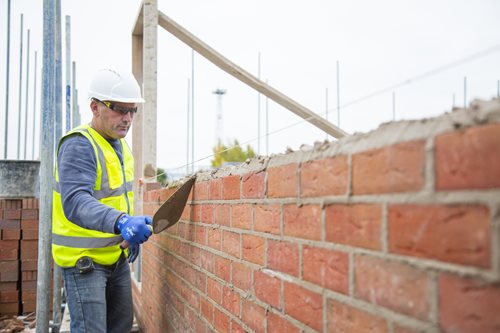Mortar is a material used in masonry construction to fill the gaps between the bricks and blocks. Mortar is a mixture of sand, a binder such as cement or lime, and water and is applied as a paste which then sets hard.
Gypsum mortar
The earliest known mortar was used by the ancient Egyptians and was made from gypsum. This form was essentially a mixture of plaster and sand and was quite soft.
Portland cement mortar
Portland cement mortar (often known simply as cement mortar) is created by mixing Portland cement with sand and water. It was invented in the mid-19th-century, as part of scientific efforts to develop stronger mortars than existed at the time. It was popularised during the late 19th century, and by 1930 it had superseded lime mortar for new construction. The main reason for this was that it sets hard and quickly, allowing a faster pace of construction.

Lime mortar
Lime mortar is created by mixing sand, slaked lime and water. The earliest known use of lime mortar dates to about 4000BC in Ancient Egypt. The process of making lime mortar is simple. Limestone is burnt in a kiln to form quicklime. The quicklime is then slaked (mixed with water) to form slaked lime, either in the form of lime putty or of hydrated lime powder. This is then mixed with sand and water to form mortar.
This kind of lime mortar, known as non-hydraulic, sets very slowly through reaction with the carbon dioxide in air. A very thick wall made of lime mortar may take centuries to completely set and harden. The speed of set can be increased by using impure limestones in the kiln, to form a hydraulic lime that will set on contact with water. Such a lime must be stored as a dry powder. Alternatively, a pozzolanic material such as calcined clay or brick dust may be added to the mortar mix. This will have a similar effect of making the mortar set reasonably quickly by reaction with the water in the mortar.
Modern mortars
Over 80 per cent of mortars used in the UK today come from factory-produced sources as opposed to being mixed on site. Their use reflects the ever-increasing demands for quality building products in the development of our built environment. Factory-produced mortars offer:
- Accurate cement content.
- Consistent quality, strength and colour.
- Reduced mixing and labour costs.
- Reduced wastage.
- Compliance with specifications.
- Technical advice and test data upon request.